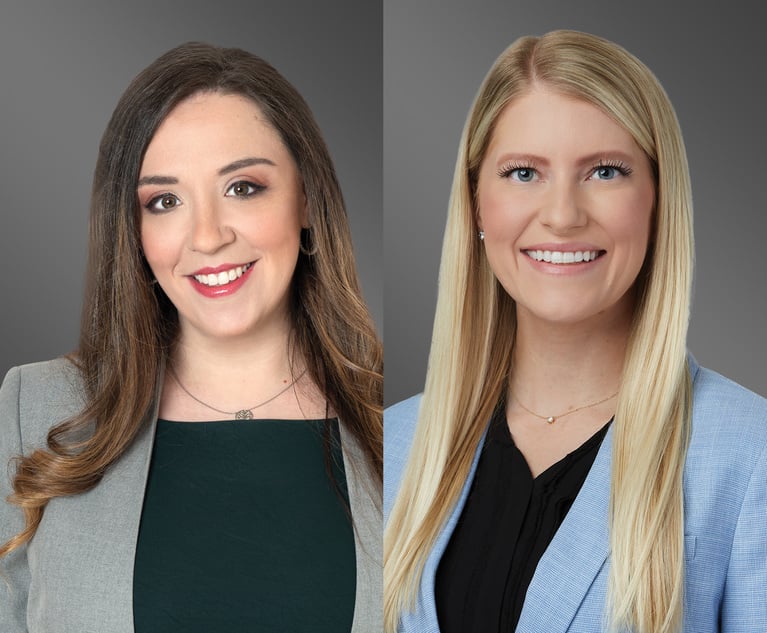#MeToo Takes Aim at Secret Settlements
Long before the hashtag #MeToo became part of the national vernacular, corporations commonly wielded an effective weapon to keep workplace sexual harassment…
September 20, 2018 at 05:52 PM
4 minute read
 Alexis McKenna, Winer McKenna & Burrett
Alexis McKenna, Winer McKenna & Burrett
Long before the hashtag #MeToo became part of the national vernacular, corporations commonly wielded an effective weapon to keep workplace sexual harassment under wraps— the non-disclosure agreement. These NDA's are designed to protect high profile executives from embarrassing publicity surrounding an accusation of sexual misconduct, while providing victims compensation for their suffering. But there's a catch. After signing the deal, the accusers are prohibited from telling their story publicly or risk harsh penalties.
Over the past year, an avalanche of #MeToo complaints surfaced which involved powerful men accused of sexual harassment, who kept their jobs and continued harassing female employees. Secret settlements in sex offense cases are a major reason why predators—whether it's Bill O'Reilly, Harvey Weinstein or even Bill Cosby—were able to hide sexual harassment or assault for so many years.
This practice of keeping circumstances secret to protect the harassers instead of the victims has run its course. Victims' advocates and lawmakers are now working together to change the law which will allow victims to talk about what happened to them while still permitting settlement amounts to remain confidential.
A new bill SB 820, known as STAND (Stand Together Against Non-Disclosures) Act has passed the legislature and advanced to Gov. Jerry Brown's desk for consideration. It would ensure that sexual assault, sexual harassment, and sex discrimination claims are effectively pursued without the constraints of secret settlement that prevent victims from talking about the facts of their case.
I've spent nearly two decades representing harassment victims and have seen a growing trend where employers insist upon their employee agreeing to a non-disclosure and non-disparagement clause to settle claims of sexual harassment, sexual abuse and sex discrimination. These cases often involve a person in a position of power- a supervisor, a manager, an executive, a corporate officer- using his or her position to subject a lower level employee to sexual degradation, humiliation and advances.
One would think that stopping this type of behavior would be a public policy concern which would necessitate public light to ensure that this behavior does not reoccur. Yet increasingly, defendants insist on secrecy so if a victim wants personal closure for their ordeal, they are forbidden to engage in any effort to ensure the same behavior doesn't happen to another unsuspecting employee.
While the business community vehemently opposes this bill for exposing employers to the public presumption of guilt, changing the law is critical for victims who want accountability for unlawful discrimination in the workplace.
Some will argue that secret settlements are necessary to effectuate a settlement, i.e., the defendant will never settle the case unless the information is kept quiet. However, this is a growing trend: not all employers have insisted on this and it used to be uncommon, and settlements were effectuated. In addition, the legislature has prohibited secret settlements in other contexts (such as childhood sexual abuse) and yet cases still settle in those contexts.
As we have seen in repeated examples, the use of secret settlements is rampant and allows repeat perpetrators to continue harassment without any accountability. The public policy concerns regarding this behavior and the element of deterrence in these civil rights cases make clear the need to eliminate these employer mandated secrecy clauses.
If STAND is signed into law, it would take effect on Jan. 1, 2019 and would apply to private and public employers in the state, including the state legislature. It's time for perpetrators and the employers that protect them to stop hiding behind a veil of secrecy. By releasing victims from these gag orders, corporations, public entitles and universities will no longer be able to use their power to buy someone's silence.
Alexis McKenna is an Oakland-based plaintiff lawyer with the firm Winer McKenna Burritt & Tillis. Her practice is dedicated to social justice and protecting the rights of individuals. She has represented numerous workers and consumers against corporations and insurance companies in the fields of employment law (harassment and discrimination), therapy and medical malpractice, personal injury.
This content has been archived. It is available through our partners, LexisNexis® and Bloomberg Law.
To view this content, please continue to their sites.
Not a Lexis Subscriber?
Subscribe Now
Not a Bloomberg Law Subscriber?
Subscribe Now
NOT FOR REPRINT
© 2025 ALM Global, LLC, All Rights Reserved. Request academic re-use from www.copyright.com. All other uses, submit a request to [email protected]. For more information visit Asset & Logo Licensing.
You Might Like
View All
What Will It Mean in California if New Federal Anti-SLAPP Legislation Passes?
9 minute read
For Growing Law Firms, Customizable Financing Can Unlock Opportunities
6 minute read
The Rise of Female Breadwinners: Challenging Traditional Divorce Dynamics
4 minute read
An Overview of Proposed Changes to the Federal Rules of Procedure Relating to the Expansion of Remote Trial Testimony
15 minute readTrending Stories
- 15th Circuit Considers Challenge to Louisiana's Ten Commandments Law
- 2Crocs Accused of Padding Revenue With Channel-Stuffing HEYDUDE Shoes
- 3E-discovery Practitioners Are Racing to Adapt to Social Media’s Evolving Landscape
- 4The Law Firm Disrupted: For Office Policies, Big Law Has Its Ear to the Market, Not to Trump
- 5FTC Finalizes Child Online Privacy Rule Updates, But Ferguson Eyes Further Changes
Who Got The Work
J. Brugh Lower of Gibbons has entered an appearance for industrial equipment supplier Devco Corporation in a pending trademark infringement lawsuit. The suit, accusing the defendant of selling knock-off Graco products, was filed Dec. 18 in New Jersey District Court by Rivkin Radler on behalf of Graco Inc. and Graco Minnesota. The case, assigned to U.S. District Judge Zahid N. Quraishi, is 3:24-cv-11294, Graco Inc. et al v. Devco Corporation.
Who Got The Work
Rebecca Maller-Stein and Kent A. Yalowitz of Arnold & Porter Kaye Scholer have entered their appearances for Hanaco Venture Capital and its executives, Lior Prosor and David Frankel, in a pending securities lawsuit. The action, filed on Dec. 24 in New York Southern District Court by Zell, Aron & Co. on behalf of Goldeneye Advisors, accuses the defendants of negligently and fraudulently managing the plaintiff's $1 million investment. The case, assigned to U.S. District Judge Vernon S. Broderick, is 1:24-cv-09918, Goldeneye Advisors, LLC v. Hanaco Venture Capital, Ltd. et al.
Who Got The Work
Attorneys from A&O Shearman has stepped in as defense counsel for Toronto-Dominion Bank and other defendants in a pending securities class action. The suit, filed Dec. 11 in New York Southern District Court by Bleichmar Fonti & Auld, accuses the defendants of concealing the bank's 'pervasive' deficiencies in regards to its compliance with the Bank Secrecy Act and the quality of its anti-money laundering controls. The case, assigned to U.S. District Judge Arun Subramanian, is 1:24-cv-09445, Gonzalez v. The Toronto-Dominion Bank et al.
Who Got The Work
Crown Castle International, a Pennsylvania company providing shared communications infrastructure, has turned to Luke D. Wolf of Gordon Rees Scully Mansukhani to fend off a pending breach-of-contract lawsuit. The court action, filed Nov. 25 in Michigan Eastern District Court by Hooper Hathaway PC on behalf of The Town Residences LLC, accuses Crown Castle of failing to transfer approximately $30,000 in utility payments from T-Mobile in breach of a roof-top lease and assignment agreement. The case, assigned to U.S. District Judge Susan K. Declercq, is 2:24-cv-13131, The Town Residences LLC v. T-Mobile US, Inc. et al.
Who Got The Work
Wilfred P. Coronato and Daniel M. Schwartz of McCarter & English have stepped in as defense counsel to Electrolux Home Products Inc. in a pending product liability lawsuit. The court action, filed Nov. 26 in New York Eastern District Court by Poulos Lopiccolo PC and Nagel Rice LLP on behalf of David Stern, alleges that the defendant's refrigerators’ drawers and shelving repeatedly break and fall apart within months after purchase. The case, assigned to U.S. District Judge Joan M. Azrack, is 2:24-cv-08204, Stern v. Electrolux Home Products, Inc.
Featured Firms
Law Offices of Gary Martin Hays & Associates, P.C.
(470) 294-1674
Law Offices of Mark E. Salomone
(857) 444-6468
Smith & Hassler
(713) 739-1250






